- Ester Busquets Alibés has a PhD in Philosophy from the Ramon Llull University, with a thesis on the ethics of care in the works of Leo Tolstoy. Graduate in Nursing from the Osona University School of Nursing, she is a lecturer in ethics at the Faculty of Health Sciences and Welfare of the University of Vic - Central University of Catalonia (UVic-UCC), and coordinator of Training and Research for this university’s Grífols Foundation Chair in Bioethics
- Among other works, she is author of the book Ética del cuidado en ciencias de la salud (Ethics of care in the health sciences; Herder, 2019) and co-author of Cura del món, dels altres i d’un mateix (Healing the world, others and oneself; Pagès, 2023). She is advisor and member of various committees on the ethics of care, research ethics committees and spaces for ethical reflection in social intervention services. She is a member of Andorra’s National Bioethics Committee
Before we begin, let’s consider the place of ethics and bioethics in history.
Ethics has existed since the start of humanity. Once, anthropologist Margaret Mead was asked what the first sign of civilization was. Most people would have mentioned the discovery of fire, but she focused on an ethical gesture and replied that the first sign was a broken femur. That is, in the hominid era, someone who broke a bone was cared for, fed and protected by someone else. The healed femur bone that was found is one of the first examples of ethics in humanity.
In contrast, bioethics appeared about fifty years ago in response to advances in the field of biomedical and biological sciences. The power of medical technology is so great that bioethics has emerged as a point of union between science and the humanities. Considering that in the last fifty years medicine has evolved more than it did in the last two thousand five hundred years, we must constantly ask ourselves if what is technically possible is a good thing to do.
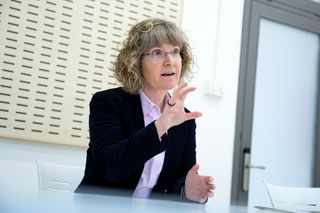
And what made you want to work in this area?
I studied nursing thinking that I also liked philosophy and in the subject of bioethics, taught by lecturer Joan Mir - brilliantly, by the way - I found the perfect synthesis between science and the humanities. Notably, UVic has always been a pioneer in the bioethical training of its students. When I went on to study philosophy, I did so with the aim of specializing in bioethics and I was lucky enough to be able to work at the Borja Institute of Bioethics, one of the leading centres in Europe and the world.
In your doctoral thesis, you took Tolstoy's novella The Death of Ivan Ilyich as your starting point. What is it in this novella that enabled you to construct your thesis? What did you want to show?
The truth is that the thesis is drawn from just four beautiful pages of Chapter 7 of the novella, which are a real philosophical treatise on what it means to care well. Within these four pages, there is a model of care, which is what I constructed in my thesis. The character of Gerassim, who is a serf, looks after his dying master, Ivan Ilyich, in an extraordinary way.
"Ethical attitudes are learned through the models that surround us"
The contribution of the thesis is based on the idea that the ethical attitudes of professionals and the general public are learnt through the models that surround us, whether they are fictional, literary or real characters. I think that anyone who wants to work in care should read these four pages, or the entire novel, to understand what good ethical care of a vulnerable person means. This is the miracle of Tolstoy!
Given the society that we are becoming, which direction do you think bioethics should take? What are the main challenges that must be faced?
If you had to associate one word with bioethics, it should be "responsibility" in the face of the power of science and technology. This does not mean that innovation should be stopped, but it does mean that we must be responsible because we can alter life. We have the goal of making science aware of challenges such as artificial intelligence, transhumanism and genetic manipulation.
The world is changing very quickly. Today, nobody considers whether we should use assisted human reproduction techniques or not; but we do discuss whether it makes sense for a woman to be a mother at seventy-four, even though this is technically possible. Twenty years ago the dilemma was whether it was ethical to create life in the laboratory; today we consider whether it is ethical to perfect it. And I'm not talking about designer babies, about whether they have blue eyes or blond hair; I'm talking about whether we can improve children’s memory, define personality traits or give them an innate physical condition so that they are ideal for elite sport. We are interested in genetic manipulation to cure diseases, but it opens the door to numerous dangers, such as the alteration of nature and loss of freedom. So we should ask: What models will be used to design these boys and girls that someone will have chosen? Who will have access to them?
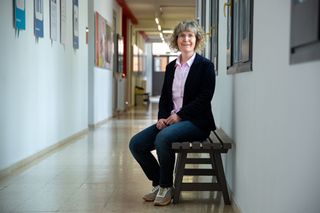
But the interest in bioethics is not the same in rich countries as in poor ones...
That’s right, there is the bioethics of the rich world, which goes in one direction, and the bioethics of impoverished countries, which goes in another. While some are investing a lot of money in anti-aging techniques and the conquest of immortality, in the other part of the world they are wondering whether it is necessary to operate on patients when there is no anesthesia or they are considering how to combat the mortality of women who die because they do not have medical care during childbirth.
And how important is bioethics in the training of health professionals?
It is important that they learn about professional ethics in a care environment through the code of ethics. We teach them to be good professionals from a technical and an ethical perspective. However, the code of ethics has its limits, because it does not resolve the conflict between two obligations. One example is that of a physiotherapist treating a school bus driver who has an addiction, or the mother of a young child who does not want life-saving chemotherapy treatment because she doesn't want her hair to fall out. It is in these conflicts that bioethics can intervene, as it provides tools for health professionals to resolve them in the best way possible.
"Bioethics provides tools to help resolve complex conflicts in the best way possible"
And what are these instruments?
Basically, deliberation. We teach them to deliberate. First, we analyse the facts: pathology, family environment and everything that can be found out a priori about the person and their context. Then we identify the conflicting values. After that, a process of reflection and discussion begins to find rational, reasonable, prudent and provisional answers. All this is undertaken with an awareness that there are no absolute answers, that we start from our own biases and we need to learn to see things from another person’s perspective, to try to reach a prudent decision.
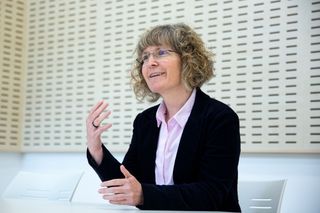
I once heard you say that the ethics of care helps to improve the health of the population when it is integrated into health and social policies. What can be done to achieve this?
Everyone knows that the essence of the nursing profession is care, although care is also essential in all other health professions. But what happens in the social sphere? Until very recently, care was restricted to the private sphere and to women. This needs to be changed because we must put care at the centre of social organization. In politics, this means transforming the way the world of work is organized and ensuring that common spaces such as hospitals, schools and neighbourhoods are places of care. Care should be present in all areas of social life, but it is very difficult for this to happen because we live in a world dominated by capitalism.
What messages would you like to convey to future health professionals in relation to bioethics?
I think there are two essential messages. The first is that we work with people and that caring means "excellence" in our respect for others. The second message is that we are caring for people who, in most cases, have not chosen to be in our hands. They simply found themselves there. When a person goes to a primary care centre or hospital, they do so in a frail situation and we should not add more suffering. Therefore, healthcare staff have the responsibility to soften, accompany, observe, listen and do everything possible to reverse the situation and, if that is not possible, to make it as bearable as possible.
"Caring for people people means 'excellence' in our respect for others"
Why is it important that UVic-UCC has a Chair in Bioethics? What are the main goals? And how would you rate the path it has taken so far?
I see having a Chair in Bioethics as a logical progression of the tradition of having taught ethics in nursing studies from the outset. Since its creation in 2015, the Chair has become a benchmark at national and international level, and outstanding bioethicists from Catalonia participate. I also think it is important that the UVic-UCC, outside of the area of the capital, can be a point of reference in this field, as is the Chair in Palliative Care, for example.
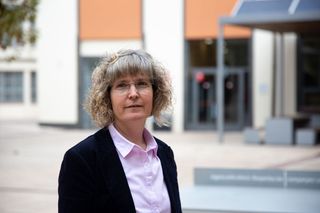
For a long time now, you have been collaborating with media outlets, reporting on aspects of ethics and bioethics. What does this more communicative dimension give to you?
It enriches me, because it forces me to think and clarify my ideas. When you prepare a scientific article, you know that it will be reviewed several times before it sees the light of day. When you write an article for a newspaper, you are your own reviewer, aware that what you write will then be read by thousands of people. Therefore, there is a very high level of demand and personal responsibility. I take it as an act of responsibility and I try to ensure that what I say includes elements for reflection and critical thinking, and also, if possible, is well written.
Do you have any personal or professional experience that has affected your career in the field of bioethics?
One of our tasks at the Chair of Bioethics is to advise the ethics committees of health or social organizations, and support them in deliberative processes. This provides me with a wealth of real examples, which I can then transfer to the classroom with students. We see all kinds of cases and the mere fact of having the opportunity to reflect with professionals from such diverse fields as aging, disability or childhood, and to see how professionals in their fields discuss issues with great sensitivity to find answers to relevant situations that impact the lives of others, keeps me up to date with ethical conflicts in the healthcare field.
It is now a year since the 75th anniversary of the proclamation of the Universal Declaration of Human Rights. What is the value of this proclamation today?
Human rights are in crisis because the world is in crisis. Article 1 reminds us that every human being has dignity and therefore deserves respect. When a person is given no value, wars and discrimination appear. But to restore dignity we need models, otherwise I don't know if we will be able to avoid collapse. Today it is difficult to have hope in the future of humanity, but, as Seneca said, “Although fear will always have more arguments, choose hope.” That is why I defend the importance of philosophy and ethics, because as long as we educate people we will be able to avoid the social crisis and we will make life better, if fundamental rights are respected.
"As long as we educate people we can avoid the social crisis"
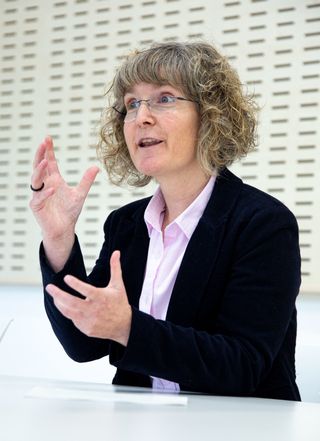
Can you give us some examples of moments in which bioethics has been key to changing the course of history for the better?
I would highlight three great moments. The first is when there was a move to end medical research with vulnerable people, which caused suffering and death in the name of science. Bioethics defends the idea that the interest of science is not superior to the good of the person. Another historical event was recognition of the autonomy of the person, in the clinical and social sphere. This put an end to “everything for the person, but without the person,” and led to more egalitarian medicine, in which the subject takes responsibility for their health. And, finally, in terms of the future, the transfer of the deliberative model that is used in ethics committees to the public. We are working on this in the framework of a research project called "Bioethical education and democratic deliberation," with the Complutense University of Madrid. In a polarized world that is not very open to debate, the aim is to introduce in the general public collective discussion processes to reach common agreements, and thus build a more democratic society.